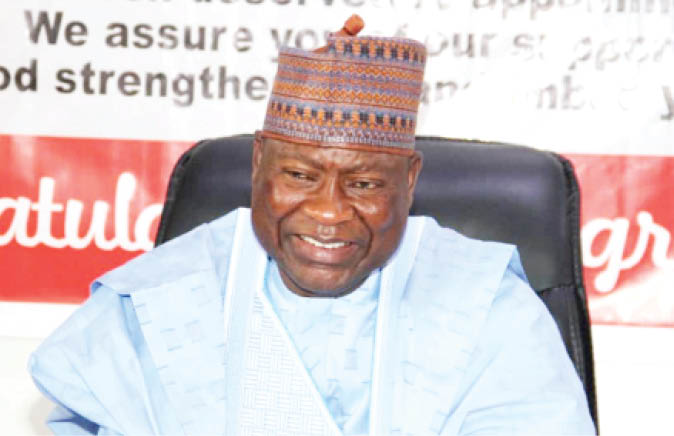Sir Joseph Ari is the Director General (DG) of the Industrial Training Fund (ITF).
He was recently reappointed for a second tenure. In this interview, he says through the ITF Reviewed Vision: Strategies for Mandate Actualisation unveiled in 2016, the fund has trained over 500,000 Nigerians who are now using the skills to earn sustainable livelihoods.
What are the highlights of your first tenure in office?
We commenced this arduous journey on September 26, 2016, with uncertain and diffident steps that over time became confident and giant strides that reverberated across the country.
When I accepted this appointment four years ago, I was in no illusion as to the magnitude of the task that awaited us. I was aware that the organisation that I had served in several capacities was in shambles. I was equally conscious that the ITF family that I had known was a thing of the past; as competing and divergent interests and opportunistic elements had torn apart its renowned togetherness.
It was against this backdrop that on assumption I promised to do two things: work as unto God to transform ITF and to heal wounds.
I am gratified that with your individual and collective support, I can confidently say that we have not only achieved and performed remarkably on both counts, but indeed outstripped all expectations given the conditions we inherited.
You initiated the ITF Reviewed Vision; what is it about?
The management unveiled the ITF Reviewed Vision: Strategies for Mandate Actualisation on assumption in 2016. We have trained over 500,000 Nigerians that are today using the skills acquired to earn sustainable livelihoods.
We also expanded our training infrastructure by completing and commissioning several projects: the Mechatronics Workshop and Administrative Block at the Industrial Skills Training Centre (ISTC), Kano, the Katsina Area Office Complex with an administrative and vocational wing, the Lagos Island Area Office Complex, the e-library complex and stores in the headquarters and classroom blocks at the ITF Staff School. It is noteworthy that most of these projects were abandoned for decades.
To ensure more efficient and effective service delivery and to promptly respond to the needs of Nigerians and our clients particularly, we have automated most of our processes, including training services, financial transactions, remittance of training contributions and the Students Industrial Work Experience Scheme (SIWES) and reimbursement activities.
Today most of our activities are paperless as they are seamlessly performed digitally, and in real time.
ITF was recently included in the Federal Government Steering Committee to drive the implementation of the various support schemes for MSMEs in the country as part of the national response to COVID-19. This initiative, which is part of government’s Economic Sustainability Plan, has brought to the doorsteps of Nigerians two stimulus programmes: the Survival Fund and the Guaranteed Offtake Stimulus Scheme, which are meant to empower MSMEs and cushion the effects of the pandemic.
But far more significantly, our strides got the endorsement and validation of President Muhammadu Buhari who graciously approved the renewal of my appointment.
What is the focus of ITF Reviewed Vision?
The plan has nine focus areas: Direct Training Services, Revenue Generation and Sustainable Funding, Resource Utilisation, Special Intervention Programmes, Human Capital Development, SIWES, Research and Development, Automation of Business Processes and other Programmes and Services. These focus areas will guide us.
Our expectation is that in the next four years, ITF will further escalate and amplify its activities, especially with regards to skills acquisition and empowerment of youths and to strengthen the MSME sector, especially in the light of the economic diversification agenda of the Federal Government.
What are your plans after your reappointment?
In our dear country Nigeria, as a result of the pandemic, unemployment has risen just as many Nigerians lost their jobs. We are, indeed, in a national emergency that requires every Nigerian to join hands and work together. It demands of us, therefore, as the leading capacity development institution in Nigeria, to urgently and significantly contribute to assist our stakeholders and the economy to overcome this challenge.
Management was conscious of the expectations even before the announcement of my reappointment, and therefore unveiled the second phase of the ITF Reviewed Vision. The plan, which implementation has already commenced and will terminate in 2024, is targeted at rectifying the pitfalls that were observed in the implementation of the first phase, build on the achievements thereof and directly address emergent challenges of our stakeholders as a result of COVID-19.
How will you be managing the working conditions of your staff?
From the targets we have set for ourselves and from the economic distortions as a result of COVID-19, the next few years will be challenging for us in very many ways.
As a result of COVID-19, many organisations have either rationalised their workforce or even closed shop because of the very difficult operational environment. This will no doubt have negative implications on the revenue generation of the fund. By implication, we will have to cultivate a culture of doing more with less.
In times of economic difficulties such as we are passing through, the first option of most managers is to cut expenses on human capital development. This will no doubt impact the number of people we train and the revenue generated therefrom. What this calls for is to be more creative and innovative, and above all develop the spirit of persistence and resilience in the marketing of our services.
Because of layoffs, the onus will be on us as the leading human capital development institution to provide as many Nigerians as possible with the necessary technical skills for them to set up on their own.
In the absence of white collar jobs, skills acquisition is the only sustainable solution to effectively tackle the problems of poverty and unemployment and the attendant implications on our society. Government expects this of us and we cannot afford to fail.
I must appreciate that discipline in the fund has improved tremendously as staff are more punctual and regular at work, but punctuality and regularity are no longer enough. All hands must be on deck in moving ITF to the next level.

 Join Daily Trust WhatsApp Community For Quick Access To News and Happenings Around You.
Join Daily Trust WhatsApp Community For Quick Access To News and Happenings Around You.


